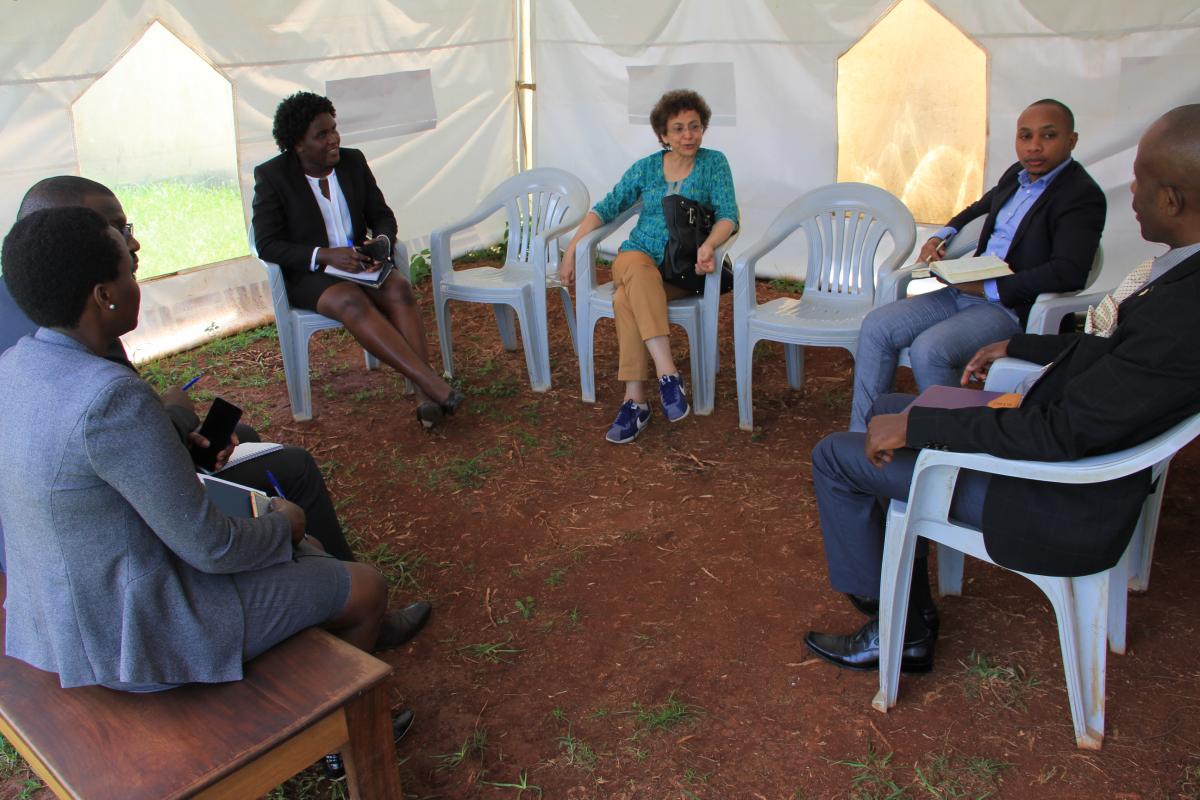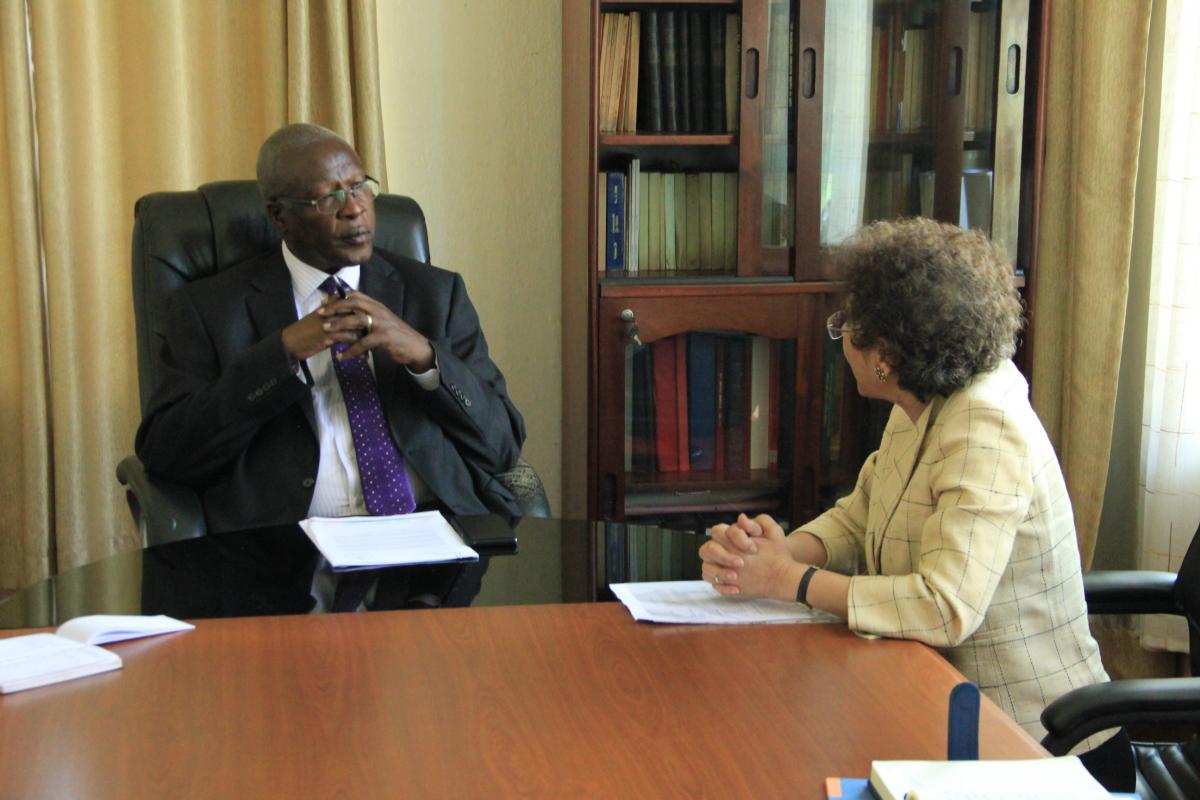“I heard on the radio that this place helps people at no cost,” said Sarah*, a client at a legal aid center in Jinja, Uganda. Sarah’s estranged husband had refused to provide maintenance for their children.
In need of legal assistance, Sarah visited Jinja Justice Centre, a Ugandan Justice Law and Order Sector (JLOS) facility that delivers legal aid services to poor and vulnerable populations.
After separating from her husband, Sarah was left to support herself and her children with her earnings from the local market. With legal aid support, she and her estranged partner started undergoing mediation to resolve their dispute.
This process, however, was interrupted once the children’s father applied for custody as a means of avoiding maintenance obligations. After their case was sent to court, Sarah discovered that her marriage had never been legally formalized, and that she therefore possessed no relevant legal documentation to strengthen her case.
Represented by the Jinja Justice Centre, Sarah was able to retain custody of her children and to receive legally enforced maintenance from their father. Speaking about the extent of support she received from the Centre, Sarah commented: “They didn’t stop at mediation. They also represented me in court when he sued me for custody.” With the help of legal aid services, she momentously secured her own livelihood and rights.
|
IDLO's Director-General Irene Khan speaks to legal service providers at the Jinja Justice Centre. |
Sarah represents one out of an estimated 5.1 billion people across the globe seeking meaningful access to justice. In Uganda, most disputes relate to land, property and family-related matters including child support. It is no coincidence that these disputes are brought forth by the poorest, most vulnerable and marginalized members of society who face systemic disadvantages and myriad barriers to access to justice.
Some do not have access to a formal court in close proximity, particularly at the sub-county level, although local council courts help to fill this gap as they are closer to the people. Others do not have a mode of transportation or money to travel the distance necessary. Women face additional obstacles arising from existing socio-economic inequalities and, in certain cases, cultural stigmas against a backdrop of patriarchal norms that limit their access to justice.
“There has been progress in Uganda; there is rapid economic development and legislation has been passed, but at the same time implementation of legislation on the ground is not always adequate,” remarked IDLO Director-General Irene Khan during a high-level mission to Uganda in September 2019.
Ms. Khan visited Uganda to deepen IDLO’s partnerships and engagement as IDLO gears up to launch its Community Justice Program. Throughout the week, she met with high-level government officials, non-governmental partners, and beneficiaries to talk about the progress made as well as some of the most prevailing challenges that IDLO can help Uganda to address.
Uganda has taken great strides in bringing justice closer to the people, particularly through JLOS, a sector-wide reform process initiated by the Government of Uganda to bring together institutions and actors working on justice issues. Among other initiatives, JLOS strives to eliminate case backlogs, improve physical and technological infrastructure, carry out justice-related legal reforms, build the capacity of key officials, such as the police, prosecutors and judicial officers, enhance sectoral coordination, and strengthen state legal aid and information services.
In addition to meeting high-level officials, Ms. Khan spoke to legal aid services providers about how to build on these advancements and continue reaching the most vulnerable members of society.
“When you look at the poor, one barrier to access to justice is the location of the courts. You find someone has to travel over 100 [km] to reach a court,” said Esther, a lawyer at the Jinja Justice Centre.
From interactions between Ms. Khan and justice providers in Jinja, it was clear that the capacity of the courts and the legal aid service providers is not adequate to meet the growing demands for justice services within this region. The Jinja Justice Centre serves populations across the Busoga region, which spans over 10,000 square km and is estimated to hold 40 per cent of the population in Eastern Uganda. The region has 12 districts, but only one High Court Circuit, located in Jinja, two resident judges and two legal aid service providers with less than 10 lawyers between them covering all the cases.
“You get 30 cases, but you find you can only take on 10. So where are the 20 going? So, it’s a serious challenge to access to justice,” continued Esther. With increased capacity, there would be more opportunities for outreach. “There are people who cannot afford the 5,000 [Ugandan Shillings, or approximately 1.24 euros] to reach Jinja. But if you travel and reach them, you’ll have changed their life. I dream of a day where we are really reaching these people at their point of need.”
Such barriers are discussed at the highest levels of the justice sector. Citing a recent report, Ugandan Chief Justice and JLOS Leadership Committee Chair Bart Katureebe noted that 80 per cent of Ugandans rely on informal justice mechanisms rather than going through the formal system. He spoke with Ms. Khan about the critical importance of strengthening informal justice mechanisms such as local court councils, these mechanisms’ linkages to formal justice institutions, and the need to strengthen existing legal aid services.
|
IDLO Director-General Irene Khan speaks to Ugandan Chief Justice Bart Magunda Katureebe about access to justice in the country. |
The Deputy Speaker of Parliament, Rt Hon. Jacob Oulanyah, discussed with Ms. Khan the need to institute a national legal aid framework and strengthen critical cultural structures upon which communities rely for dispute resolution.
Engagements were also held with the Minister of Justice and Constitutional Affairs, Hon. Kahinda Otafiire, together with the Deputy Solicitor General, Christopher Gashirabake, on how IDLO can support the JLOS agenda of enhancing the administration of justice, maintaining law and order, and promoting observance of human rights.
Through JLOS-led initiatives, Uganda’s justice-related indicators have improved remarkably over the past few years. At the same time, challenges to access to justice are complex. In its upcoming community justice program, IDLO seeks to the efforts of support JLOS to build the national-, district- and community-level capacity of justice actors in order to provide the most vulnerable citizens with quality and sustainable legal aid, legal information and redress.
At the end of her mission, Ms. Khan concluded: “I believe that IDLO, working very closely with partners on the ground, with civil society actors, with institutions of the Justice Law and Order Sector of this country, can indeed make a difference.”
Photos: IDLO/Lorelei Taylor French
Photo gallery




